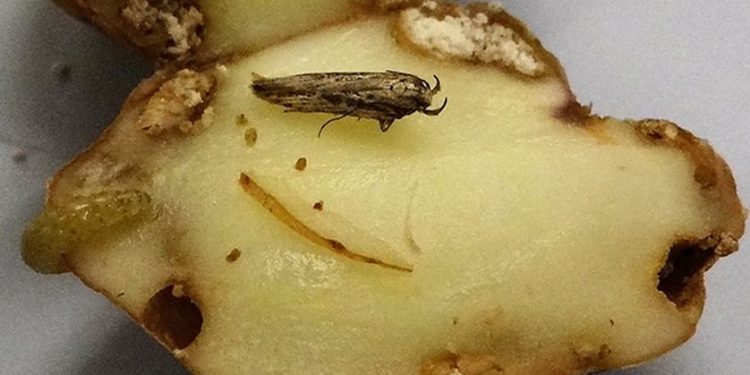Colombia is facing a grave agricultural threat with the invasion of the Guatemalan Moth, an ominous pest capable of wreaking havoc on potato crops. The Instituto Colombiano Agropecuario (ICA) has sounded the alarm, attributing the moth’s proliferation to the El Niño phenomenon, which poses a significant risk to agricultural output.
The ICA has issued a Phytosanitary Alert to potato growers in regions such as Boyacá, Cauca, Cundinamarca, Nariño, Norte de Santander, Santander, and Tolima due to the rapid spread of the Guatemalan Moth. This voracious pest not only deteriorates the quality of potatoes but also inflicts damage by burrowing through tubers, rendering them unfit for consumption or use as seed.
Characterized by its small, dark brown to gray appearance, the female moths lay between 150 to 360 eggs near or on potato tubers, leading to multiple generations that escalate the infestation. The larvae, adept at tunneling through tubers, exacerbate the damage by causing rot and rendering the potatoes inedible.
The ICA has proposed several preventive measures to mitigate the spread of the Guatemalan Moth:
- Plant Healthy Seeds: Ensure the use of disease-free seeds during planting.
- Clear Harvest Residues: Remove crop residues, particularly tubers, to eliminate potential food sources for the pest.
- Hill Soil Around Tubers: Mound soil around potato plants to shield tubers from egg-laying and larval infestation.
- Implement Irrigation: Employ irrigation practices to prevent soil cracking and larvae penetration.
- Timely Harvesting: Harvest potatoes promptly to minimize the risk of tuber damage.
- Deploy Pheromone Traps: Use pheromone traps to lure and capture male moths, curbing population growth.
- Utilize Black Light Traps: Install black light traps to reduce adult moth populations.
By adhering to these preventive strategies, farmers and agricultural stakeholders can fortify their defenses against the Guatemalan Moth and safeguard Colombia’s vital potato crops.
Colombia’s battle against the Guatemalan Moth underscores the urgent need for proactive measures to protect agricultural livelihoods and ensure food security. With the implementation of preventive strategies advocated by the ICA, farmers can mitigate the impact of this invasive pest and preserve the integrity of potato cultivation in the region.







